Confidential HIV Testing, Diagnosis and Treatment in NYC for Men and Women
If you have any questions, to schedule a consultation, please contact us or call/text: 1-646-663-4125.
HIV Testing: What You Need to Know
What is HIV/AIDS? Who is at Risk of HIV?
HIV (human immunodeficiency virus) is a virus that attacks the body’s immune system and makes the infected person vulnerable to disease and infection. HIV spreads through certain body fluids. Without treatment, HIV infection progresses to a severe phase called AIDS (acquired immunodeficiency syndrome).
There is no effective cure for HIV, but it can be controlled with medications (antiretroviral therapy). Anyone can get HIV, but the following populations are at high risk:
- Gay or bisexual men: MSM (men who have sex with men) make up 2 percent of the US population but account for about 60 percent of new HIV infections. Half the people living with HIV in America are MSM. Male-to-male sexual contact accounts for more than 75 percent of HIV infections in men.
- Unprotected heterosexual contact with an infected partner: In women, sex with an infected male partner accounts for more than 85 percent of HIV infections. In men, unprotected heterosexual contact accounts for about 12 percent of HIV infections.
- Injection drug users: Nearly half of all drug abusers with HIV are unaware they are infected. About 7 percent of HIV infections in men and 14 percent of HIV infections in women are from injection drug use.
- Hepatitis C virus: Hepatitis C infection is prevalent among injection drug users and co-occurs with HIV. About 50-80 percent of injection drug users have both HIV and hepatitis C infections.
- Ethnic minorities: There is a disproportionately high rate of HIV infections in African-Americans, Hispanics, Asians, and Native Americans. Nearly two-thirds of new HIV infections among MSM are in men from minority groups. One study (link) found HIV infections in Hispanic men and women were three times higher than Whites.
- Youth: About 20 percent of new cases of HIV are in young people between 13 and 24 years old (prevalence is highest in the 20-24 age group).
- Older People: In 2010, 16 percent of new HIV infections in America were in people above the age of 50. In 2015, one-half of the people living with HIV/AIDS were in the over-50 population.
- Criminal justice system: HIV infections in individuals who are in the criminal justice system are up to 5 times higher than the surrounding communities.
Where to Get Tested for HIV in NYC?
At New York Urology Specialists, we offer same-day HIV testing and PEP (Post-exposure prophylaxis) for men and women.
We also perform comprehensive STD testing for other infections. We offer confidential appointments. Our prices are affordable with or without insurance. Call/text today: 1-646-663-4125 or make an appointment online.
How Common is HIV in New York City?
New York has the highest number of new HIV cases in the country. About 109,000 people in New York are living with HIV/AIDS, of which about 72 percent are men and 28 percent are women. About 44 percent of New Yorkers with HIV are Blacks, 34 percent are Hispanics, and 18 percent are Whites.
One in five New Yorkers with HIV do not know they have the infection. Each year there are about 2,000 new HIV diagnoses in New York. About 1300-1800 people with HIV die in New York City every year. HIV/AIDS related-complications have claimed 100,000 lives in New York to date.
- More than 40 percent of HIV-positive individuals in New York are in the over-50 age group.
- More than 75 percent of new HIV diagnoses and AIDS-related deaths in New York City are in minority groups (African-Americans and Hispanics).
- In 2016, more than half the new cases of HIV in New York City were diagnosed in MSM (gay or bisexual men who have sex with men).
- 60 percent of HIV diagnoses in NYC are in the 20-40 years age group (link).
HIV Patients in New York City by the borough of residence (link) (approximate values):
- Brooklyn – 25 percent
- The Bronx – 23 percent
- Manhattan – 20 percent
- Queens – 18 percent
- Staten Island – 3 percent
- Outside NYC – 9 percent
ZIP codes with the highest HIV diagnosis rates include Central Harlem-Morningside Heights, East Harlem, and Chelsea-Clinton.
HIV in Men in New York City
- About 40 percent of men diagnosed with HIV in New York City are Black, 35 percent are Hispanics, and 18 percent are White.
- More than two-thirds of men in New York with HIV are between 20 and 40 years old.
- About 70 percent of HIV transmission in men in New York City is in MSM (men who have sex with men).
HIV in Women in New York City (link)
- About 60 percent of women diagnosed with HIV in New York City are Black, 31 percent are Hispanics, and 6 percent are White.
- Nearly half the women in New York with HIV are between 30 and 50 years old.
- About 63 percent of HIV transmission in women in New York City is through heterosexual contact.
What are the Symptoms of HIV?
When someone first gets infected with HIV, there are no symptoms. In fact, a person can feel and look healthy for as long as 10 years after getting the infection. However, early HIV treatment can help an infected person stay healthy longer. That’s why it’s important to undergo regular HIV testing, especially if you are a high-risk group (gay or bisexual men, injection drug users) or you’ve had unprotected heterosexual sex. At New York Urology Specialists, we offer confidential, same-day HIV testing for men and women in the Bronx and other boroughs of New York City. Call and set up an appointment today with our board-certified urologists for comprehensive STD evaluation including HIV.
Early HIV Symptoms
In the first 2-4 weeks after HIV infection, the infected person may experience nonspecific flu-like symptoms (fever, achiness, feeling generally unwell). This is a highly contagious stage because the viral load (the amount of virus in the body) is very high. After a few weeks, the symptoms abate and may disappear for years. However, once infected, a person with HIV will always have the infection and can pass it on to others.
Late HIV Symptoms
The HIV virus destroys the CD4 and T cells in the body that fight infections. People who progress to AIDS suffer from opportunistic infections and certain types of cancers. These are rare diseases that only occur in severely immunocompromised individuals. When the immune system becomes very weak, HIV becomes AIDS. Some of the symptoms of HIV/AIDS include (link):
- Thrush (thick, white coating in the mouth)
- Recurrent severe infections
- Fatigue, dizziness, headaches
- Unexplained rapid weight loss
- Easy bruising
- Swollen glands in the neck, armpit, or groin
- Diarrhea, fever, night sweats
- Skin rashes or purple-colored growths in the mouth or on the skin
- Prolonged dry coughing spells
- Numbness and tingling, loss of reflexes, weak muscles
- Bleeding from the mouth, nose, vagina, or anus
- Confusion, decreased cognition, personality change
- Frequent severe vaginal yeast infections and chronic pelvic inflammatory disease in women
Early and consistent treatment with antiretroviral therapy can boost the immune system and delay symptoms of HIV/AIDS. The earlier a person is diagnosed, the sooner they can begin treatment. If you have had unprotected vaginal, anal, or oral sex, talk to the board-certified urologists at New York Urology Specialists today to get STD testing including HIV testing.
I’m Worried About HIV – What Should I Do?
Talk to top urologists nearby at New York Urology Specialists. We offer confidential HIV testing for men and women. Based on test results and assessment of risk, PrEP or PEP may be recommended for you.
PrEP (pre-exposure prophylaxis) is an HIV treatment for people who don’t have HIV. It is an ongoing treatment for future protection against HIV. A medication called Truvada (taken as a once-daily pill) reduces the chances of getting HIV through sex by 90 percent and through shared needles by 70 percent (link). The protection is even higher when combined with safe sex practices. PrEP is recommended for people at high risk of HIV, such as those who:
- don’t use condoms regularly
- are in a same-sex relationship (men who have sex with men)
- are in a relationship with an HIV-positive person
- have a sex partner who is at high risk of HIV (for example, injection drug user)
- have multiple sexual partners
- have recently had other STDs such as syphilis, gonorrhea, and chlamydia
- work in the sex industry
- are injection drug users
PrEP (Truvada) works best when taken regularly. Remember, it does not protect against other STDs and safe sex with condoms is always recommended. Most people on PrEP have no side effects (there may be some nausea, headache, and loss of appetite when the medication is first started). People on PrEP must undergo HIV testing every 3 months. Most health insurance plans cover Truvada. Call our offices today to see fellowship-trained urologists for an evaluation to see if PrEP is right for you.
PEP (post-exposure prophylaxis) is a type of emergency treatment for people who have recently been exposed to HIV. The treatment consists of a series of antiretroviral pills that must be started within 3 days (72 hours) of exposure. The sooner treatment is started, the more effective it is. PEP medicines are taken once or twice daily for 28 days or more. These medications stop the spread of the HIV virus in the body. If you think you may have been exposed to HIV, call the board-certified urologists at New York Urology Specialists without delay to see if you need PEP. This treatment is generally recommended to people who in the last 72 hours:
- had unprotected sex
- are victims of sexual assault
- shared needles with an HIV-positive person
Remember, PEP is not a replacement for safe sex practices or PrEP. The treatment is not 100 percent effective and it doesn’t reduce the risk of future HIV infections like PrEP. Every hour counts in PEP treatment. If you think you may have got infected with HIV in the last 3 days, don’t waste any time. Schedule an appointment at the offices of New York Urology Specialists immediately. We are easily accessible from Queens and Manhattan. Repeat HIV testing is needed after PEP treatment is completed (4-6 weeks after exposure) and again after 3-6 months.
Why Choose New York Urology Specialists for HIV Testing and Treatment?
- Same-Day Confidential HIV Testing for Men and Women in New York City
- Reliable Comprehensive STD Testing including HIV
- Assessment and Recommendations for PrEP/PEP HIV Treatment by Board-Certified Urologists
- Top New York City Urologists
Scheduling Appointments for HIV Testing at New York Urology Specialists
If you have any questions, to schedule a consultation, please contact us or call 1-646-663-4125.
STDs are Treatable in Nearly Every Man and Woman
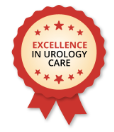
Urologists are doctors specializing in the treatment of infections in men and women caused by sexually transmitted diseases as well as bladder infections (UTI). By the virtue of our experience and skill, we are able to offer an effective treatment option for nearly every man and women with urinary problems and bladder control problems.
We treat some of the most complex STD problems including:
- Persistent urinary urgency
- Frequent recurrence of genital warts
- Frequent recurrence of herpes outbreaks
- HIV prevention
- Genital warts in the urethra
- Treatment of infections when antibiotics do not work well
- Testing for urinary ureaplasma and mycoplasma.
|
This article is also available in: 





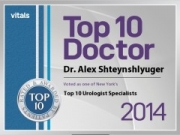
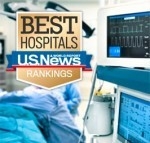
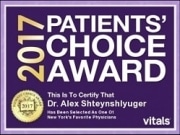
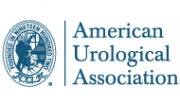
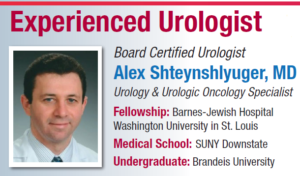 Schedule an Appointment with Dr. Shteynshlyuger:
Schedule an Appointment with Dr. Shteynshlyuger: